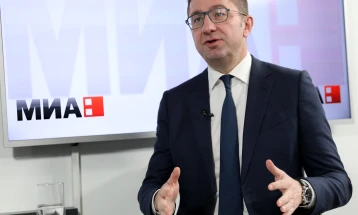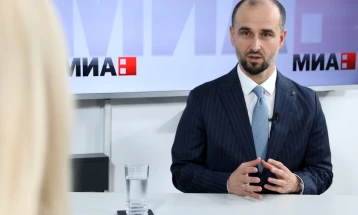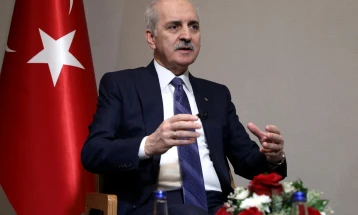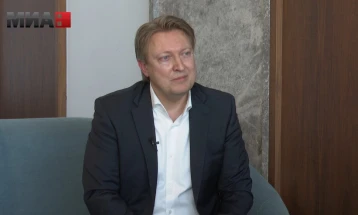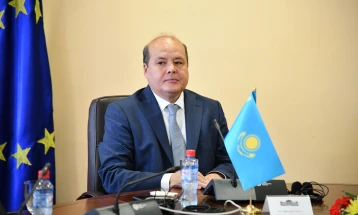Bilateral screening should demonstrate not only transposition of EU acquis but also its implementation, Tilev tells MIA
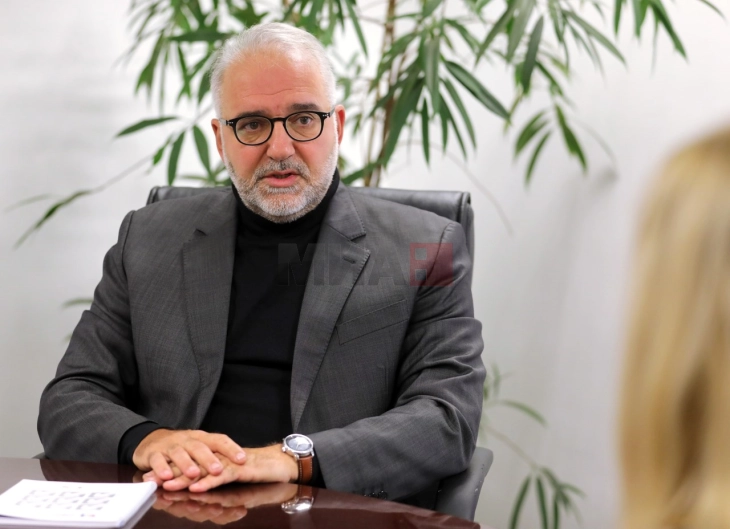
Skopje, 11 November 2022 (MIA) – The bilateral screening will begin Friday in Brussels. This screening, and the explanatory screening, which officially began on September 15, will run in parallel and are expected to end in November 2023. State Counselor at the Secretariat for European Affairs, Dragan Tilev, tells MIA that the bilateral screening is an opportunity for North Macedonia to demonstrate that not only it transposes the European legislation but also that the country will fully implement it, in line with the standards that apply to the EU member states.
“Through the explanatory screening, the European Commission explained the EU acquis, i.e., which parts of it will have to be transposed and fully implemented during our accession negotiations, until our EU membership. The bilateral screening is the second stage, during which we present our progress, i.e., the level of transposition that we are at and how we are implementing the legislation, with a special focus on the latter,” Tilev tells MIA.
 We have been transposing the EU acquis, he says, since the signing of the Stabilization and Association Agreement, and based on our estimates, around 45 percent of it have already been transposed, but the remaining 55 percent still have to be implemented, which is a huge task and we also have to demonstrate that we are applying it practically as well.
“That is usually done through the assessment of track records, i.e., a statistical record from five years back on the functioning of the judiciary, the system of control, financial control, the Public Revenue Office, the functioning of all other institutions, in charge of providing certain services to the citizens,” says Tilev.
When asked by MIA if certain stages of the screening process will have to be repeated if the constitutional amendments are not adopted by the end of 2023, Tilev says that if a two-thirds majority is secured and the constitutional amendments are adopted, then the country will immediately conclude that part of the intergovernmental conference and move forward with the negotiations, just like other countries, in this case Albania.
“But I would separate these two issues, the bilateral screening or the conclusion of the entire screening process, and the political issue of securing a two-thirds majority which is extremely sensitive. I have previously said that it is not good for this issue to remain open for too long. But it is up to the political parties, the politicians and Parliament to make the decision, hopefully it will be a positive decision,” Tilev tells MIA.
We have been transposing the EU acquis, he says, since the signing of the Stabilization and Association Agreement, and based on our estimates, around 45 percent of it have already been transposed, but the remaining 55 percent still have to be implemented, which is a huge task and we also have to demonstrate that we are applying it practically as well.
“That is usually done through the assessment of track records, i.e., a statistical record from five years back on the functioning of the judiciary, the system of control, financial control, the Public Revenue Office, the functioning of all other institutions, in charge of providing certain services to the citizens,” says Tilev.
When asked by MIA if certain stages of the screening process will have to be repeated if the constitutional amendments are not adopted by the end of 2023, Tilev says that if a two-thirds majority is secured and the constitutional amendments are adopted, then the country will immediately conclude that part of the intergovernmental conference and move forward with the negotiations, just like other countries, in this case Albania.
“But I would separate these two issues, the bilateral screening or the conclusion of the entire screening process, and the political issue of securing a two-thirds majority which is extremely sensitive. I have previously said that it is not good for this issue to remain open for too long. But it is up to the political parties, the politicians and Parliament to make the decision, hopefully it will be a positive decision,” Tilev tells MIA.
 The conclusion of the bilateral screening, Tilev adds, should be seen as separate, because it will happen, sometime around the end of 2023, when the transposition of the acquis and the functionality of our democratic institutions will be fully assessed.
“This is of exceptional significance because the step after the bilateral screening is very important and crucial for us, I am referring to the screening reports prepared by the EC, which are professional, extensive and thorough reports of their perception of us, their assessment of our implementation of the legislation. These reports come in four parts – the first part is an overview of the EU acquis, the second is an overview of our legislation, then conclusions and recommendations on what should be done and the final part are the benchmarks. Whether the country is ready to immediately open negotiations on the cluster or whether certain benchmarks have to be met before the cluster is opened,” says Tilev.
For example, the Fundamentals cluster, says Tilev, the most extensive and the most politically sensitive cluster since it is a key cluster, to be opened first and closed last after all other chapters are closed, which means it will remain open for the longest time and is the most complex one in terms of content, because it includes political, economic and institutional elements.
“All of these elements are quite complex by nature, some of them are deeply vertical, they touch upon the functioning of the state itself, others are horizontal, such as the public administration reform. These are all elements which we have to fulfill and there are also two already known benchmarks that we have to meet in order to begin negotiations on the Fundamentals cluster. These are benchmarks, i.e., roadmaps for public administration reform and, perhaps the most important aspect – a roadmap for the rule of law. As a country we will have to propose these benchmarks, align them with the EC, and then the Council has to unanimously adopt them thus opening negotiations on the Fundamentals cluster,” says Tilev.
The conclusion of the bilateral screening, Tilev adds, should be seen as separate, because it will happen, sometime around the end of 2023, when the transposition of the acquis and the functionality of our democratic institutions will be fully assessed.
“This is of exceptional significance because the step after the bilateral screening is very important and crucial for us, I am referring to the screening reports prepared by the EC, which are professional, extensive and thorough reports of their perception of us, their assessment of our implementation of the legislation. These reports come in four parts – the first part is an overview of the EU acquis, the second is an overview of our legislation, then conclusions and recommendations on what should be done and the final part are the benchmarks. Whether the country is ready to immediately open negotiations on the cluster or whether certain benchmarks have to be met before the cluster is opened,” says Tilev.
For example, the Fundamentals cluster, says Tilev, the most extensive and the most politically sensitive cluster since it is a key cluster, to be opened first and closed last after all other chapters are closed, which means it will remain open for the longest time and is the most complex one in terms of content, because it includes political, economic and institutional elements.
“All of these elements are quite complex by nature, some of them are deeply vertical, they touch upon the functioning of the state itself, others are horizontal, such as the public administration reform. These are all elements which we have to fulfill and there are also two already known benchmarks that we have to meet in order to begin negotiations on the Fundamentals cluster. These are benchmarks, i.e., roadmaps for public administration reform and, perhaps the most important aspect – a roadmap for the rule of law. As a country we will have to propose these benchmarks, align them with the EC, and then the Council has to unanimously adopt them thus opening negotiations on the Fundamentals cluster,” says Tilev.
 He says this will be the likely epilogue by the end of 2023, if a two-thirds majority is secured and if the EC Report is prepared in time, so we can be ready with the roadmaps which the EU Council has to adopt. He adds that by the end of 2023, in an optimal scenario, the country would begin negotiations on the Fundamentals cluster, and eventually the other clusters as well.
Regarding the areas in which the country has weaknesses, bearing in mind the EC Report's remarks that greater efforts are needed in the fight against organized crime and corruption, Tilev says there is progress in each of the clusters and chapters, and all of the chapters will have difficult elements.
“This was also ascertained by the EC Report, a certain level of transposition has already been achieved, which was also noted by the EC. The public already knows that although we are not negotiating, we are already on the same level with Serbia and Montenegro, however, we have to continue with the reforms so that we can maintain that pace. Therefore, if the whole process of the intergovernmental conference is concluded and we continue with the negotiations and the other clusters, then perhaps, according to some in the EC, we can become front-runners and speed up the entire process of negotiations,” Tilev points out.
According to him, each chapter and cluster contains difficult elements, because these are thorough reforms which are meant to be irreversible.
“You already mentioned it, I will add to it, above all the most difficult aspect is the fight against organized crime and corruption, all signals are indicating that we should focus on that, that it should be one of the key elements of this Government’s reform program, I would also say of the programs of the governments that will come after, because the process will not end in one or two years, but will continue, our target is 2030,” he says.
Tilev says that there are some fairly complex chapters which will require a lot of effort.
“Here I would highlight the chapter on food safety, because the food safety criteria that should be applied in practice concern all of us, but also because it is an extremely extensive chapter. The majority of the acquis concerns food safety, environment and agriculture. These are the largest chapters and clusters. The scope of the legislation is the challenging part here,” Tilev says.
He says this will be the likely epilogue by the end of 2023, if a two-thirds majority is secured and if the EC Report is prepared in time, so we can be ready with the roadmaps which the EU Council has to adopt. He adds that by the end of 2023, in an optimal scenario, the country would begin negotiations on the Fundamentals cluster, and eventually the other clusters as well.
Regarding the areas in which the country has weaknesses, bearing in mind the EC Report's remarks that greater efforts are needed in the fight against organized crime and corruption, Tilev says there is progress in each of the clusters and chapters, and all of the chapters will have difficult elements.
“This was also ascertained by the EC Report, a certain level of transposition has already been achieved, which was also noted by the EC. The public already knows that although we are not negotiating, we are already on the same level with Serbia and Montenegro, however, we have to continue with the reforms so that we can maintain that pace. Therefore, if the whole process of the intergovernmental conference is concluded and we continue with the negotiations and the other clusters, then perhaps, according to some in the EC, we can become front-runners and speed up the entire process of negotiations,” Tilev points out.
According to him, each chapter and cluster contains difficult elements, because these are thorough reforms which are meant to be irreversible.
“You already mentioned it, I will add to it, above all the most difficult aspect is the fight against organized crime and corruption, all signals are indicating that we should focus on that, that it should be one of the key elements of this Government’s reform program, I would also say of the programs of the governments that will come after, because the process will not end in one or two years, but will continue, our target is 2030,” he says.
Tilev says that there are some fairly complex chapters which will require a lot of effort.
“Here I would highlight the chapter on food safety, because the food safety criteria that should be applied in practice concern all of us, but also because it is an extremely extensive chapter. The majority of the acquis concerns food safety, environment and agriculture. These are the largest chapters and clusters. The scope of the legislation is the challenging part here,” Tilev says.
 In the area of the environment, transport, energy, he adds, we are talking about huge projects in order to join the regional and trans-European networks.
“We are talking about large funds, big investments, our financial and fiscal potential is relatively limited as a result of the economic crisis, covid, the situation in Ukraine, but the investments have to be made, because the networks must be established and fully connected to the region and Europe so that the effect is greater,” he says.
Tilev emphasizes that some areas are sensitive because they concern literally everyone.
“For example, the public administration reform – for years we have been talking about a small and efficient administration, and obviously if it was easy it would be done already, however it is difficult because it concerns a huge number of employees, which would have to be reorganized, will have to raise their level of administrative capacity, will have to be digitized, so that the public administration is rationalized and made efficient and that it can reach out to the citizens, because ultimately those institutions exist to provide a service to the citizens,” Tilev emphasizes.
In the area of the environment, transport, energy, he adds, we are talking about huge projects in order to join the regional and trans-European networks.
“We are talking about large funds, big investments, our financial and fiscal potential is relatively limited as a result of the economic crisis, covid, the situation in Ukraine, but the investments have to be made, because the networks must be established and fully connected to the region and Europe so that the effect is greater,” he says.
Tilev emphasizes that some areas are sensitive because they concern literally everyone.
“For example, the public administration reform – for years we have been talking about a small and efficient administration, and obviously if it was easy it would be done already, however it is difficult because it concerns a huge number of employees, which would have to be reorganized, will have to raise their level of administrative capacity, will have to be digitized, so that the public administration is rationalized and made efficient and that it can reach out to the citizens, because ultimately those institutions exist to provide a service to the citizens,” Tilev emphasizes.
 On whether the country has the capacity to negotiate, given that there is an outflow of qualified personnel, Tilev says there is always a danger that qualified people will want to leave to a different post which may offer better pay or a better future. Which is why, he says, the administration should consist of people who are truly determined to work there.
“There will always be fluctuation, I hope that it will not be at such a level that it would disrupt the functioning of the system itself. We have been building a system to coordinate the process of EU accession since 1998/99 onwards, and it is constantly being upgraded. Its functionality has never been put into question. We are probably the only country in the entire region that has a consistently stable and functional system, and I would like to believe that the young people, by joining this system, will in a way invigorate it,” says Tilev.
He is adamant that the public administration reform is complex because it also requires that the size of the administration be reduced by increasing its efficiency, therefore rationalizing its impact on the budget, but this, he underlines, must not be detrimental to the functioning of the institutions, nor the provision of services to the citizens.
Neda Dimova Prokikj
Photo: Frosina Naskovikj
Translated by Angel Dimoski
On whether the country has the capacity to negotiate, given that there is an outflow of qualified personnel, Tilev says there is always a danger that qualified people will want to leave to a different post which may offer better pay or a better future. Which is why, he says, the administration should consist of people who are truly determined to work there.
“There will always be fluctuation, I hope that it will not be at such a level that it would disrupt the functioning of the system itself. We have been building a system to coordinate the process of EU accession since 1998/99 onwards, and it is constantly being upgraded. Its functionality has never been put into question. We are probably the only country in the entire region that has a consistently stable and functional system, and I would like to believe that the young people, by joining this system, will in a way invigorate it,” says Tilev.
He is adamant that the public administration reform is complex because it also requires that the size of the administration be reduced by increasing its efficiency, therefore rationalizing its impact on the budget, but this, he underlines, must not be detrimental to the functioning of the institutions, nor the provision of services to the citizens.
Neda Dimova Prokikj
Photo: Frosina Naskovikj
Translated by Angel Dimoski
 We have been transposing the EU acquis, he says, since the signing of the Stabilization and Association Agreement, and based on our estimates, around 45 percent of it have already been transposed, but the remaining 55 percent still have to be implemented, which is a huge task and we also have to demonstrate that we are applying it practically as well.
“That is usually done through the assessment of track records, i.e., a statistical record from five years back on the functioning of the judiciary, the system of control, financial control, the Public Revenue Office, the functioning of all other institutions, in charge of providing certain services to the citizens,” says Tilev.
When asked by MIA if certain stages of the screening process will have to be repeated if the constitutional amendments are not adopted by the end of 2023, Tilev says that if a two-thirds majority is secured and the constitutional amendments are adopted, then the country will immediately conclude that part of the intergovernmental conference and move forward with the negotiations, just like other countries, in this case Albania.
“But I would separate these two issues, the bilateral screening or the conclusion of the entire screening process, and the political issue of securing a two-thirds majority which is extremely sensitive. I have previously said that it is not good for this issue to remain open for too long. But it is up to the political parties, the politicians and Parliament to make the decision, hopefully it will be a positive decision,” Tilev tells MIA.
We have been transposing the EU acquis, he says, since the signing of the Stabilization and Association Agreement, and based on our estimates, around 45 percent of it have already been transposed, but the remaining 55 percent still have to be implemented, which is a huge task and we also have to demonstrate that we are applying it practically as well.
“That is usually done through the assessment of track records, i.e., a statistical record from five years back on the functioning of the judiciary, the system of control, financial control, the Public Revenue Office, the functioning of all other institutions, in charge of providing certain services to the citizens,” says Tilev.
When asked by MIA if certain stages of the screening process will have to be repeated if the constitutional amendments are not adopted by the end of 2023, Tilev says that if a two-thirds majority is secured and the constitutional amendments are adopted, then the country will immediately conclude that part of the intergovernmental conference and move forward with the negotiations, just like other countries, in this case Albania.
“But I would separate these two issues, the bilateral screening or the conclusion of the entire screening process, and the political issue of securing a two-thirds majority which is extremely sensitive. I have previously said that it is not good for this issue to remain open for too long. But it is up to the political parties, the politicians and Parliament to make the decision, hopefully it will be a positive decision,” Tilev tells MIA.
 The conclusion of the bilateral screening, Tilev adds, should be seen as separate, because it will happen, sometime around the end of 2023, when the transposition of the acquis and the functionality of our democratic institutions will be fully assessed.
“This is of exceptional significance because the step after the bilateral screening is very important and crucial for us, I am referring to the screening reports prepared by the EC, which are professional, extensive and thorough reports of their perception of us, their assessment of our implementation of the legislation. These reports come in four parts – the first part is an overview of the EU acquis, the second is an overview of our legislation, then conclusions and recommendations on what should be done and the final part are the benchmarks. Whether the country is ready to immediately open negotiations on the cluster or whether certain benchmarks have to be met before the cluster is opened,” says Tilev.
For example, the Fundamentals cluster, says Tilev, the most extensive and the most politically sensitive cluster since it is a key cluster, to be opened first and closed last after all other chapters are closed, which means it will remain open for the longest time and is the most complex one in terms of content, because it includes political, economic and institutional elements.
“All of these elements are quite complex by nature, some of them are deeply vertical, they touch upon the functioning of the state itself, others are horizontal, such as the public administration reform. These are all elements which we have to fulfill and there are also two already known benchmarks that we have to meet in order to begin negotiations on the Fundamentals cluster. These are benchmarks, i.e., roadmaps for public administration reform and, perhaps the most important aspect – a roadmap for the rule of law. As a country we will have to propose these benchmarks, align them with the EC, and then the Council has to unanimously adopt them thus opening negotiations on the Fundamentals cluster,” says Tilev.
The conclusion of the bilateral screening, Tilev adds, should be seen as separate, because it will happen, sometime around the end of 2023, when the transposition of the acquis and the functionality of our democratic institutions will be fully assessed.
“This is of exceptional significance because the step after the bilateral screening is very important and crucial for us, I am referring to the screening reports prepared by the EC, which are professional, extensive and thorough reports of their perception of us, their assessment of our implementation of the legislation. These reports come in four parts – the first part is an overview of the EU acquis, the second is an overview of our legislation, then conclusions and recommendations on what should be done and the final part are the benchmarks. Whether the country is ready to immediately open negotiations on the cluster or whether certain benchmarks have to be met before the cluster is opened,” says Tilev.
For example, the Fundamentals cluster, says Tilev, the most extensive and the most politically sensitive cluster since it is a key cluster, to be opened first and closed last after all other chapters are closed, which means it will remain open for the longest time and is the most complex one in terms of content, because it includes political, economic and institutional elements.
“All of these elements are quite complex by nature, some of them are deeply vertical, they touch upon the functioning of the state itself, others are horizontal, such as the public administration reform. These are all elements which we have to fulfill and there are also two already known benchmarks that we have to meet in order to begin negotiations on the Fundamentals cluster. These are benchmarks, i.e., roadmaps for public administration reform and, perhaps the most important aspect – a roadmap for the rule of law. As a country we will have to propose these benchmarks, align them with the EC, and then the Council has to unanimously adopt them thus opening negotiations on the Fundamentals cluster,” says Tilev.
 He says this will be the likely epilogue by the end of 2023, if a two-thirds majority is secured and if the EC Report is prepared in time, so we can be ready with the roadmaps which the EU Council has to adopt. He adds that by the end of 2023, in an optimal scenario, the country would begin negotiations on the Fundamentals cluster, and eventually the other clusters as well.
Regarding the areas in which the country has weaknesses, bearing in mind the EC Report's remarks that greater efforts are needed in the fight against organized crime and corruption, Tilev says there is progress in each of the clusters and chapters, and all of the chapters will have difficult elements.
“This was also ascertained by the EC Report, a certain level of transposition has already been achieved, which was also noted by the EC. The public already knows that although we are not negotiating, we are already on the same level with Serbia and Montenegro, however, we have to continue with the reforms so that we can maintain that pace. Therefore, if the whole process of the intergovernmental conference is concluded and we continue with the negotiations and the other clusters, then perhaps, according to some in the EC, we can become front-runners and speed up the entire process of negotiations,” Tilev points out.
According to him, each chapter and cluster contains difficult elements, because these are thorough reforms which are meant to be irreversible.
“You already mentioned it, I will add to it, above all the most difficult aspect is the fight against organized crime and corruption, all signals are indicating that we should focus on that, that it should be one of the key elements of this Government’s reform program, I would also say of the programs of the governments that will come after, because the process will not end in one or two years, but will continue, our target is 2030,” he says.
Tilev says that there are some fairly complex chapters which will require a lot of effort.
“Here I would highlight the chapter on food safety, because the food safety criteria that should be applied in practice concern all of us, but also because it is an extremely extensive chapter. The majority of the acquis concerns food safety, environment and agriculture. These are the largest chapters and clusters. The scope of the legislation is the challenging part here,” Tilev says.
He says this will be the likely epilogue by the end of 2023, if a two-thirds majority is secured and if the EC Report is prepared in time, so we can be ready with the roadmaps which the EU Council has to adopt. He adds that by the end of 2023, in an optimal scenario, the country would begin negotiations on the Fundamentals cluster, and eventually the other clusters as well.
Regarding the areas in which the country has weaknesses, bearing in mind the EC Report's remarks that greater efforts are needed in the fight against organized crime and corruption, Tilev says there is progress in each of the clusters and chapters, and all of the chapters will have difficult elements.
“This was also ascertained by the EC Report, a certain level of transposition has already been achieved, which was also noted by the EC. The public already knows that although we are not negotiating, we are already on the same level with Serbia and Montenegro, however, we have to continue with the reforms so that we can maintain that pace. Therefore, if the whole process of the intergovernmental conference is concluded and we continue with the negotiations and the other clusters, then perhaps, according to some in the EC, we can become front-runners and speed up the entire process of negotiations,” Tilev points out.
According to him, each chapter and cluster contains difficult elements, because these are thorough reforms which are meant to be irreversible.
“You already mentioned it, I will add to it, above all the most difficult aspect is the fight against organized crime and corruption, all signals are indicating that we should focus on that, that it should be one of the key elements of this Government’s reform program, I would also say of the programs of the governments that will come after, because the process will not end in one or two years, but will continue, our target is 2030,” he says.
Tilev says that there are some fairly complex chapters which will require a lot of effort.
“Here I would highlight the chapter on food safety, because the food safety criteria that should be applied in practice concern all of us, but also because it is an extremely extensive chapter. The majority of the acquis concerns food safety, environment and agriculture. These are the largest chapters and clusters. The scope of the legislation is the challenging part here,” Tilev says.
 In the area of the environment, transport, energy, he adds, we are talking about huge projects in order to join the regional and trans-European networks.
“We are talking about large funds, big investments, our financial and fiscal potential is relatively limited as a result of the economic crisis, covid, the situation in Ukraine, but the investments have to be made, because the networks must be established and fully connected to the region and Europe so that the effect is greater,” he says.
Tilev emphasizes that some areas are sensitive because they concern literally everyone.
“For example, the public administration reform – for years we have been talking about a small and efficient administration, and obviously if it was easy it would be done already, however it is difficult because it concerns a huge number of employees, which would have to be reorganized, will have to raise their level of administrative capacity, will have to be digitized, so that the public administration is rationalized and made efficient and that it can reach out to the citizens, because ultimately those institutions exist to provide a service to the citizens,” Tilev emphasizes.
In the area of the environment, transport, energy, he adds, we are talking about huge projects in order to join the regional and trans-European networks.
“We are talking about large funds, big investments, our financial and fiscal potential is relatively limited as a result of the economic crisis, covid, the situation in Ukraine, but the investments have to be made, because the networks must be established and fully connected to the region and Europe so that the effect is greater,” he says.
Tilev emphasizes that some areas are sensitive because they concern literally everyone.
“For example, the public administration reform – for years we have been talking about a small and efficient administration, and obviously if it was easy it would be done already, however it is difficult because it concerns a huge number of employees, which would have to be reorganized, will have to raise their level of administrative capacity, will have to be digitized, so that the public administration is rationalized and made efficient and that it can reach out to the citizens, because ultimately those institutions exist to provide a service to the citizens,” Tilev emphasizes.
 On whether the country has the capacity to negotiate, given that there is an outflow of qualified personnel, Tilev says there is always a danger that qualified people will want to leave to a different post which may offer better pay or a better future. Which is why, he says, the administration should consist of people who are truly determined to work there.
“There will always be fluctuation, I hope that it will not be at such a level that it would disrupt the functioning of the system itself. We have been building a system to coordinate the process of EU accession since 1998/99 onwards, and it is constantly being upgraded. Its functionality has never been put into question. We are probably the only country in the entire region that has a consistently stable and functional system, and I would like to believe that the young people, by joining this system, will in a way invigorate it,” says Tilev.
He is adamant that the public administration reform is complex because it also requires that the size of the administration be reduced by increasing its efficiency, therefore rationalizing its impact on the budget, but this, he underlines, must not be detrimental to the functioning of the institutions, nor the provision of services to the citizens.
Neda Dimova Prokikj
Photo: Frosina Naskovikj
Translated by Angel Dimoski
On whether the country has the capacity to negotiate, given that there is an outflow of qualified personnel, Tilev says there is always a danger that qualified people will want to leave to a different post which may offer better pay or a better future. Which is why, he says, the administration should consist of people who are truly determined to work there.
“There will always be fluctuation, I hope that it will not be at such a level that it would disrupt the functioning of the system itself. We have been building a system to coordinate the process of EU accession since 1998/99 onwards, and it is constantly being upgraded. Its functionality has never been put into question. We are probably the only country in the entire region that has a consistently stable and functional system, and I would like to believe that the young people, by joining this system, will in a way invigorate it,” says Tilev.
He is adamant that the public administration reform is complex because it also requires that the size of the administration be reduced by increasing its efficiency, therefore rationalizing its impact on the budget, but this, he underlines, must not be detrimental to the functioning of the institutions, nor the provision of services to the citizens.
Neda Dimova Prokikj
Photo: Frosina Naskovikj
Translated by Angel Dimoski 

